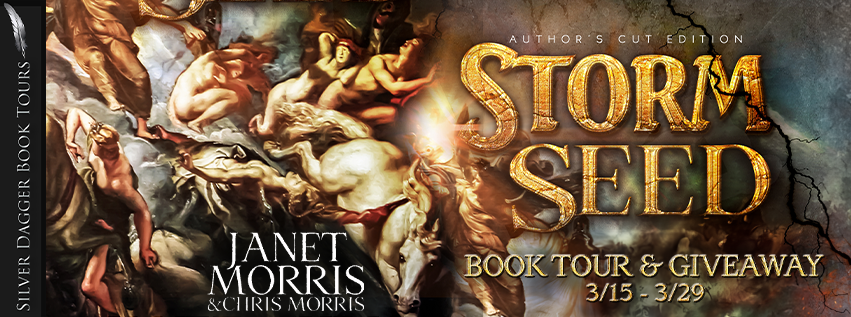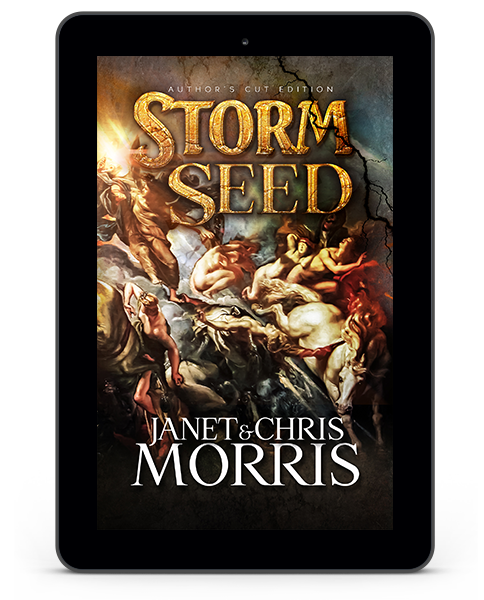High adventure and mystical intrigue await… ➱Storm Seed (Sacred Band Series Book 7) Epic Fantasy by Janet & Chris Morris Book Sale with Guest Post and giveaway
High adventure and mystical intrigue await…
Storm Seed
Sacred Band Series Book 7
by Janet & Chris Morris
Genre: Epic Fantasy
Hot off the presses, the final "lost" volume of the iconic Sacred Band series in an all-new Author's Cut edition.
High adventure awaits in Storm Seed by Janet & Chris Morris:
- Travel with the Sacred Band of Stepsons to a future undreamed.
- Meet the changeling son of Tempus and the Froth Daughter.
- Learn what it takes to become a dragon.
- Bring gods to a godless realm.
Tempus the Black, avatar of the Storm God, and his partner Niko reunite the Sacred Band for a mission to a dying world. And from there -- should the gods allow -- to mystical Lemuria. -
Praise for the Sacred Band series: "Janet Morris, Tempus (1987), and, with Chris Morris, Tempus Unbound (1989), The Sacred Band (2010).
"A fantasy series about the Sacred Band of Stepsons, an elite army modeled on the fourth-century B.C.E. Sacred Band of Thebes. The stories explore the fraught personal relationships of mixed hetero- and homosexual troops, only sometimes paired, as they fight for their commander, the immortal Tempus. Morris includes archaeological and historical details, from physical items to social practices, religion, and philosophy, to create a fantasy world that is, in many ways, more historically accurate than many popular accounts of antiquity." -- Robert W. Cape, Jr, in Classical Traditions in Science Fiction, Brett M. Rogers & Benjamin Eldon Stevens, eds., Oxford University Press
**ON SALE now for only $2.99!**
Amazon * B&N * Bookbub * Goodreads
** The Sacred Band Series is Perseid Press’ featured series of March **
--Get them all on sale for Only $2.99 each!--
Find the buy links at
[excerpt from Storm Seed: TALE OF THREE WOMEN]
Deep
under the sea, where a volcano grew slowly and warmed the water, they kept the
child.
In
a submarine cavern where phosphorescent sea life gave the only light, Jihan
would visit her son at feeding time. Here currents brimmed with salty
nutrients, and tiny fish schooled round like rainbow garlands among
starfish-encrusted columns.
Far
below sun and sky, sleepless sharks stood guard over him. Mermaids were his
nannies, and squid rocked him in their arms.
Such
a childhood should have satisfied any son of a Froth Daughter. Jihan called her
boy Cyrus, partly after his father. She found him giant seahorses to ride. He
had catfish and dogfish and electric eels to play with, and manta rays to race
him through the cavern’s sweep. But Cyrus never felt a father’s love, so Jihan
told him stories meant to teach him who and what he was.
Nor
had Cyrus ever felt a grandfather’s love, for Jihan’s father was Stormbringer
himself, lord of wind and wave, who had never approved his daughter’s marriage.
In
Stormbringer’s opinion, this fruit of Jihan’s union constituted an affront to
nature. So the boy grew tall in his cave at the bottom of the sea, away from
society.
Never
a happy child, Cyrus’ temper grew worse as he grew older. One day his mother
swam down to see her son and found three mermaids dead: eviscerated, floating
near the cavern’s ceiling in red eddies of their blood.
“Cyrus,”
she’d called for the wild-eyed child, hoping to find him hunched in shadows,
his white hair flowing round him like seaweed. “Why did you do such a thing?”
“Let
me out of here, Mother!” an errant current burbled.
How
many times had Cyrus begged her to do just that? She hunted for the boy in the
cave, then along the seafloor. She called on whales and porpoises to search to
the surface of the sea. She enlisted nymphs and mermen to ask far and wide for
news of Cyrus.
Eventually,
Jihan realized that the voice she’d heard was merely an echo of her son’s
voice, ringing in her own guilty mind. She had to find him.
But
she couldn’t. Cyrus had escaped, and now his trail was cold: The boy had
disappeared.
Jihan
summoned her bodyguard of sharks and mermen to gather up the murdered mermaids.
The sharks feasted upon the corpses with all due ceremony, until only the
mermen’s tears remained, mixing with the currents that still whispered, “Let me
out of here, Mother!”
But
Jihan had promised her father, Stormbringer, she never would release him. And
now her son was gone.
So
Jihan went to see her father, who ruled the tempests and the waves.
When
he heard her tale, the sea around her father grew cold. Stormbringer shook his
massive, seaweedy head. “You brought this upon yourself,” he thundered, so that
the whole seafloor quaked. “I warned you not to bear the child of a human.”
But
Jihan had borne the child of an immortalized man named Tempus, perhaps a
demigod himself. And she had brought this child into a world where he was
different from all other creatures.
“Nonetheless,
Father,” Jihan said, looking Stormbringer in one red and brooding eye, “I must
find Cyrus. He has his father’s temper and your blood in his veins. He is too
angry and too powerful to be abroad in the world of men.”
“You’re
sure that’s where he is?” As her father spoke, the sea around them began to
roil and warm. Currents caught her and spun her around in her father’s midst.
“I’m
sure,” she called to the rising waterspout that was Stormbringer. “That’s where
he’s gone. He wants to find his father.”
There.
She’d said it.
As
if that statement were more than he could bear, Stormbringer grabbed her in his
waterspout arms and whirled her about and cast her out of the depths.
Up
into the air she came, as if the sea itself would spit her out, reject her.
Light
blinded Jihan for an instant; waves slapped at her, and she was afraid.
But
then the sun on her scales reminded her body how to change itself, and the
surface of the sea buoyed her until her limbs shone bronze and supple in the
light of day as she swam for shore.
*
The
witch called Roxane brooded in her bower near the end of everything, watching
sunlight sparkle on the watery wheels surrounding the city at the edge of time.
It
had cost her greatly to come so far. Now she rested. She sat every day in the
woods and watched the gleaming city, with its electrum spires and its
privileged folk— watched and waited.
Sometimes
caravans arrived—but not on any regular schedule. Roxane bided her time. Once
she’d been a mighty witch of awesome power, a great enchantress. Now she was a
refugee. If not for her burning need to find the man who’d caused her downfall,
she might have died of her misery.
But
Roxane did not die. Although trapped for a time in hell itself, she’d
survived—and eventually escaped to work her way here, feeding on the souls of
sheep and rats and rabbits, and the occasional snippet of rumor that leant
strength to her heart.
She
would find Nikodemos, her beloved, the human who’d deserted her. Then she would
begin anew.
So
she promised herself each sunrise when she woke, and this morning was no
exception. Today, as on every day since she’d escaped her prison in hell, she
pulled herself out into the sunlight and revealed her battered body to the
heavens.
Naked,
she raised a fist to the skies and renewed her vow: revenge served as Roxane’s
wellspring, her truest love. To wreak vengeance, one needed strength. And for
strength, one needed inspiration. The man called Nikodemos, ghost from her
past, would ever be Roxane’s inspiration.
This
morning, having found not only two rabbits but an unwary wanderer to feast upon
the night before, Roxane felt greatly strengthened.
The
wanderer with whom she’d slept soon became the corpse upon whom she slept. The
poor fool gave her all his vigor as he died. This morning, when she’d pulled
herself out of her poor bower of fir into the light, her legs almost held her.
They were no longer twisted; nor were they weak and lame. The hands she spread
today in the sunlight boasted smooth, white skin—not the chicken skin of old
age.
A
few more days, a few more fools, and she’d be ready to approach the city’s
gates and bespell the guards to admit her.
But
not yet; not until she became as beautiful as ever she’d been. When she saw her
Nikodemos again, she’d find no pity on his handsome face. She’d not look into
his eyes and see there only memories of her reflected glory.
She
must become the old Roxane, Death’s Queen, once more. And now her complete
resurrection was certain, its accomplishment merely a question of time. She’d
known that being so close to Niko would inspire her.
That
passion had dragged her across mountains and deserts and seas where any lesser
sorceress would have died. Eating scraps, she’d remembered power. Bathing in
lust, she’d remembered love. And she’d promised herself that she’d reclaim
everything she’d almost had— starting with Nikodemos.
This
was the only fitting thanks to the powers that had fooled fate and old enemies
to set her free. Free she was, and abroad on the land once more.
Soon
even the sky would shudder under her influence, and she’d fly high in the
clouds once more—take wing whenever she chose.
Sitting
in the sunshine, she made a fist and closed her eyes. Gathering her legs under
her, she sat cross-legged and naked in the daylight. Below the crest of her
hill stretched a meadow; in that meadow would she make her beloved appear to
her.
She
willed it so. She envisioned him beside her there. She called his name. She
conjured a gem of power to manifest within her tight-closed fist.
The
gem she summoned yet existed— somewhere. Her enemies had not destroyed that
shard of eternal strength; only cast it far away from its accustomed place in
her hand. So it would come to her, because she willed it.
She
called the shard. She called the man. She called her power. And above her head,
clouds scudded across the morning sun.
In
her mind’s eye, she saw the meadow’s end, where the last moat that ringed the
city gave way to unhallowed ground.
And
there she swore she heard a cry of delight, a tinkling laugh, and then another.
But still she kept her eyes shut. Still she willed the shard of power to come
to her. Still she held her outstretched fist before her.
And
then she felt it: first, a sensation of spinning, as if she and the clouds and
the sun were whirling while the earth stood still. Then came a prickling, a
burning in her groin that welled up and out, into her extremities and into her
head.
At
last she felt coldness in her fist.
Only
when she felt that cold did Roxane open her eyes.
Above
her head, the sky was bright but white, completely overcast, giving the land a
surreal quality and stealing every shadow from the meadow.
Her
fist too seemed white as snow. She opened it.
There,
in her palm, glittered a cold and tiny stone, hardly more than a blue pebble,
too small to make a decent ring, barely enough for an earring.
But
in her palm, there it rested: a smidgen of the jewel of power; a fragment of
the shard which had belonged to the greatest archmage of them all. Dominion
over all the beasts of the field and the laws which they obeyed long had been
the prize of any who possessed it.
Now,
in her sorely diminished state, even a pebble of power could be enough . . .
She
nearly cried out in delight. She shook her head and raised her face to the sky,
as if to a mirror. And she smiled, conjuring all the beauty she’d once
possessed.
Full
of triumph, about to return to her bower to rest, she heard that laugh again.
This
time, Roxane looked down into the meadow. And there she saw not her beloved
Nikodemos, but a child and a woman playing amidst the clover.
A
child and a woman: what an opportunity they presented. She mustn’t worry who
they might be; mustn’t be disappointed if they were simple travelers, or city
folk taking a stroll.
But
her heart knew that these were more than vulgar folk as she scurried into her
bower, seeking her rags.
Rags
were not the attire best suited to such meetings, but Roxane would waste no
power on vanity.
Before
heading down the slope, she paused only long enough to drop the pebble into the
rabbit-fur pouch she’d made for amulets and tie the pouch around her neck.
Surely,
whomever her passion had summoned to the meadow wouldn’t care if she did not
look her best.
She
still limped a bit, favoring her right side. A white streak like a lightning
bolt yet showed in her raven hair. But down she hobbled, not standing straight
or switching her hips. Let these see how time had ravaged her. She’d been the
last sight of too many mortal fools to let appearances stop her.
The
fires of hell and her own determination had scourged all vanity from her flesh.
When
all is lost, one merely begins again. With her eyes fixed firmly on her prey,
Roxane hitched her way painfully downslope.
The
curly-haired boy saw her first and said, “Look, Nanny, a witch!” The brat must
have been four or five. Children always saw the truth. Because of this, they
were far more dangerous than adults— and more nutritious to a famished soul
such as hers.
“Hush,
don’t say such things, dear,” said the nanny, who had golden hair and a comely
form and a dress that soon would replace Roxane’s rags. “It’s merely an
unfortunate beggar woman. It’s good luck to give alms to the poor, dear.”
The
blonde woman raised a hand and waved to Roxane and smiled.
Then,
bending down over a wicker basket, the nanny said, “Here, Prince, take the
unfortunate woman one of these rolls and a bit of this cheese. It’s important
for royalty such as you, Highness, to learn charity and compassion. Run along,
now.”
Roxane
was sure she’d never had a better day. Didn’t these foolish city folk realize
that, beyond their walls, evil reigned? Hadn’t they learned not to trust in
humanity? Didn’t they know enough to fear strangers, and all who had less than
they?
“Here’s
a treat for you, Madame,” called the nanny, as the child came scampering
Roxane’s way, dressed in wide-eyed innocence and silk.
Roxane
nearly hesitated. Might this be a trick? It seemed too easy. She cast a glance
at the city. Was some archmage in there, trying to trap her while she yet was
weak? But no, this was the city, the city of knowledge and wonder at the edge
of time, which surely had cleansed itself of all evil long before Roxane came.
And
the boy, upon reaching Roxane, held out a perfect hand to her, grinning. “Madam
Beggar, here are your alms.” Baby teeth gleamed.
Roxane
took the crusty bread and the creamy wedge of cheese and then let them fall,
holding tight to the child’s hand instead.
“What’s
your name, little one?” she asked.
The
boy said, “Prince Nino, son of Queen Tabet and her consort, Nikodemos—”
A
cry of joy tore itself from Roxane’s throat. Forgetting all about the nanny and
the nanny’s fine dress, she fell upon the child and swept him into her arms.
The
child screamed. The nanny screamed.
Ignoring
their screams, Roxane fed, feasting on this choicest morsel that fate could
provide.
The
nanny rushed at them, but Roxane was already stronger. Her feet hardly touched
the ground as they began to change.
She
lifted the boy, and herself. Holding him, she swooped across the meadow as her
shoulders became winged. Those wings took to the air. She flapped upward, her
grip on the child becoming the grip of an eagle’s talons. The eagle wore a
rabbit’s fur pouch around its neck, and its wingspread was twice that of a
man’s height.
The
prince who dangled from her talons hardly struggled any longer; there was too
little life left in him for that.
When
the bower of fir that had been Roxane’s home for so long was right beneath her,
she dropped the child, and dived downward in his wake.
Then
she caught an updraft and circled above the meadow to see if the nanny would
follow.
But
the woman yet wept in the grass, a splotch among the clover. Roxane’s eagle
eyes saw every crenel on the ramparts of the electrum-towered city, and none
there remarked her.
Before
she returned to her fir bower to finish her feast, she soared high over the
city and hovered there, watching from her perch on columns of air.
Thus
she witnessed the commotion below, when the nanny at last reached the city
gates crying that a witch had taken the queen’s son. She saw the queen hasten
into the courtyard.
And
she saw her beloved, Nikodemos, come running to take Queen Tabet in his arms as
she fainted.
All
the emotion coming up from that place was a further delight, choice manna, and
Roxane’s wings grew stronger.
Best
of all was the moment when, circling low in delicious danger to catch a glimpse
of her lover’s face, Niko looked up as the shadow of her wings fell over him.
Then
it was time to go: the nanny was screeching; Niko was pointing; on the
ramparts, guards aimed crossbows and spears her way.
She
called out once to her beloved in her eagle’s voice before she beat the air and
soared out of reach.
Of
course, he couldn’t know what she’d said. But Roxane knew that, in his heart,
Niko would realize she was back.
In
the meantime, there was a feast waiting for her, a warm body with fresh-cracked
bones and salty blood. Niko would thank her, one day, for all that Roxane was
doing—and would do—to free him from entrapment by some scheming queen.
With
every bite her beak tore from her prize, she felt better. She no longer worried
about returning to human form. She had enough sustenance, in this one catch, to
bring her nearly back to health.
After
she’d eaten her fill, she’d fly off with her prey, north a bit, where no
hunters would find them until she’d consumed every sumptuous bit.
And
then she’d be ready to unite with her lover once again, beautiful and full of
power. All she’d ever been.
Even Niko would see the truth of her
resurgence. She’d make sure of it.

What is
something unique/quirky about you?
We breed Morgan horses. We consult with Morgan breeders to
help them choose breeding combinations to achieve a desired result.
We are also song writers; Janet plays bass guitar and Chris
sings and plays guitar. We have an album on MCA records. Look for Christopher
Crosby Morris on Soundcloud or N1M.com
Can
you, for those who don't know you already, tell something about yourself and
how you became an author?
Janet wrote her first book in 1975 and Chris was the first
one to read and comment on it. Their marriage survived. A routine emerged where
Chris would read aloud all the new drafts and we would make edits on the spot.
After a few books Chris’ ideas became frequent enough that we agreed he should
have credit for writing, whereas before we had kept separate Janet’s
storytelling and Chris’ songwriting. The rest, as they say is history.
Who is your
hero and why?
Heraclitus of Ephesus, a pre-socratic philosopher, whose Cosmic
Fragments foreshadow our knowledge of reality and how to perceive it.
Among his precepts is the statement that change alone is unchanging. We’ve
worked Heraclitus’ fragments in here and there throughout our books.
Which of
your novels can you imagine being made into a movie?
All of them. We write cinematically, our books are vivid adventures
undertaken without knowing the destination. I, the Sun, The
Sacred Band, Outpassage and M.E.D.U.S.A. are
particularly suited to film. The Threshold Series is a feast of
opportunities for today’s special effects creators.
What
inspired you, to write Storm Seed?
We were
fascinated by gene splicing and invitro and other reproductive technologies and
set out to explore a culture trying to preserve itself underground through
experimentation with those techniques. It actually makes for some great
adventures when you consider that everything alive may be reproduced
artificially some day.
Convince us
why you feel Storm Seed is a must read.
Today there
are forces at work trying to limit reproductive possibilities and freedoms and
may be leading to this sort of scenario that we wrote about in Storm Seed. We
all need to get smart on these things because our lives inevitably will be
affected by them.
Who
designed your book covers?
Most of our covers, including Storm Seed, are
realized by Roy Mauritsen, a gifted graphic artist.
Advice to
writers?
As for advice to writers, here is all we know: write the
story you want to read. Start at the beginning, go to the end, and stop.
Seriously. From start to finish you must inhabit the construct in a manner that
makes the reader choose to continue; if you, as the writer, can’t feel what
it’s like being there, your readers can’t either. So close your eyes, look at
your feet where they are standing on the story’s ground; tell me what you see.
Tell me what you hear. Ask at the end of each paragraph ‘what happens next?’. If
you lose touch with it, wait until you’re back inside it. Tell the story that comes
to you, and from you, to me.
Best selling author Janet Morris began writing in 1976 and has since published more than 30 novels, many co-authored with her husband Chris Morris or others. Most of her fiction work has been in the fantasy and science fiction genres, although she has also written historical and other novels. Morris has written, contributed to, or edited several book-length works of non-fiction, as well as papers and articles on nonlethal weapons, developmental military technology and other defense and national security topics.
Christopher Crosby Morris (born 1946) is an American author of fiction and non-fiction, as well as a lyricist, musical composer, and singer-songwriter. He is married to author Janet Morris. He is a defense policy and strategy analyst and a principal in M2 Technologies, Inc. He writes primarily as Chris Morris, but occasionally uses pseudonyms.
Website * Facebook * Twitter * Instagram * Bookbub * Bookbub
Amazon * Amazon * Goodreads * Goodreads
Follow the tour HERE for special content and a giveaway!
Choice of print or ebook copy of Storm Seed ,
$10 Amazon giftcard
– 1 winner each!
#EpicFantasy
#Fantasybooks #MythicFantasy #Adventure #OnSale #StormSeed #SacredBandSeries
@PerseidPublishing @perseid_press #books #readers #reading #booklovers #booktok
#bookbuzz #bookboost #BookPromo #AuthorPromo
#BookBlogger #Bookstagram #bookish #bookclub #MustRead
#Writersofinstagram #AmReading #BookTour #Giveaway
#writingcommunity #readerscommunity
@SilverDaggerBookTours









The excerpt sounds like a great fantasy story. Thanks for sharing.
ReplyDelete